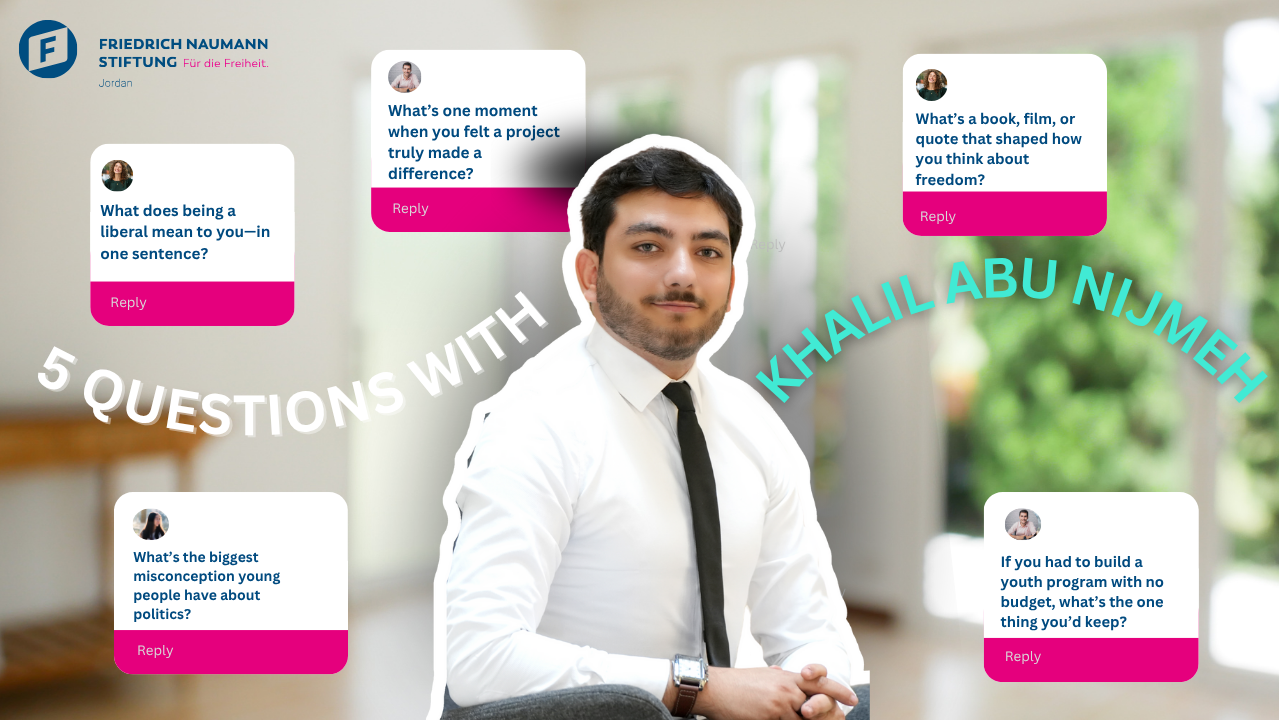Five Questions with Khalil Abu Nijmeh
Liberalism and Youth in Jordan

As part of our ongoing efforts to shed light on the ideas that guide our work and the people behind them, we sat down with Khalil Abu Nijmeh, Jordan Project Coordinator, to discuss liberalism, political misconceptions, impactful moments, and the future of youth engagement. Here’s what he had to say:
1. What does being a liberal mean to you—in one sentence?
“To me, being a liberal means believing in a framework of values that prioritizes individual freedom, equal rights, and the dignity of every human being—but it goes beyond that,” says Khalil.
He emphasizes that liberalism is not a rigid ideology but a flexible set of principles that adapts to the needs and realities of each nation. While values like freedom, justice, and tolerance are widely recognized, how we apply them in Jordan must reflect the country’s unique social, cultural, and political context.
“I see liberalism not only as a philosophy but as a practical solution to the problems we face in Jordan. It offers a path to protect minorities, uphold human dignity, and create a stable balance between our diverse communities. In a country like ours, with its complex identity fabric, liberalism can act as a unifying force that promotes peaceful coexistence.”
On the economic front, Khalil highlights how liberalism fosters free enterprise, innovation, and individual initiative—crucial elements for tackling unemployment, encouraging entrepreneurship, and moving away from state-dependency. “By empowering people economically and politically, liberalism paves the way for sustainable development and a more inclusive future,” he adds.
2. What’s the biggest misconception young people have about politics?
“One of the biggest misconceptions is that politics is only about elections, politicians, and political parties,” Khalil explains. “But in reality, politics is present in our everyday decisions—in how we speak, organize, demand change, and express our values. It’s about how power is distributed, who gets to speak, and whose rights are protected.”
He also points to another major misconception in the region: the belief that liberalism opposes religion. “This couldn’t be further from the truth,” he states. “Liberalism protects religious freedom, ensuring that everyone has the right to believe, practice, or not practice as they choose. It does not aim to erase religion from society; rather, it ensures that no single religious view is imposed on others.”
In doing so, liberalism safeguards all religions by creating a respectful and fair space for diverse beliefs. “In short, liberalism isn’t about removing values—it’s about giving space for everyone’s values to exist without domination or fear. That’s a political choice, and it’s one young people need to be more aware of.”
3. What’s one moment when you felt a project truly made a difference?
Khalil reflects on a powerful moment during the Free Youth Course: “When a previously disengaged participant confidently presented a liberal perspective in front of peers and experts—it was a powerful reminder of how impactful thoughtful education can be.”
He adds that it’s in moments like these, when someone finds their voice and speaks up for freedom and rights, that the long-term value of this work becomes evident. “It’s not just about learning,” he notes. “It’s about transformation.”
4. What’s a book, film, or quote that shaped how you think about freedom?
A quote Khalil often returns to during trainings is:
“Liberalism is believing in the freedom of those you disagree with just as much as the freedom of those you agree with.”
“This captures the true spirit of liberalism,” he explains. “It reminds us that freedom is not selective—it must apply to everyone equally, even those who challenge our views.”
5. If you had to build a youth program with no budget, what’s the one thing you’d keep?
“If there’s one part to keep for training even without a budget, I would keep the principle of open dialogue,” Khalil says. “Because it’s working. Because it is always about dialogue, free debate, and security. It’s essential for any political process.”
He underscores that even in the absence of financial resources, a space for secure, honest discussion remains the core of meaningful engagement.
Through these reflections, Khalil Abu Nijmeh offers a thoughtful and grounded perspective on liberalism, politics, and youth empowerment in Jordan—reminding us that ideas become powerful when they are lived, shared, and debated.
